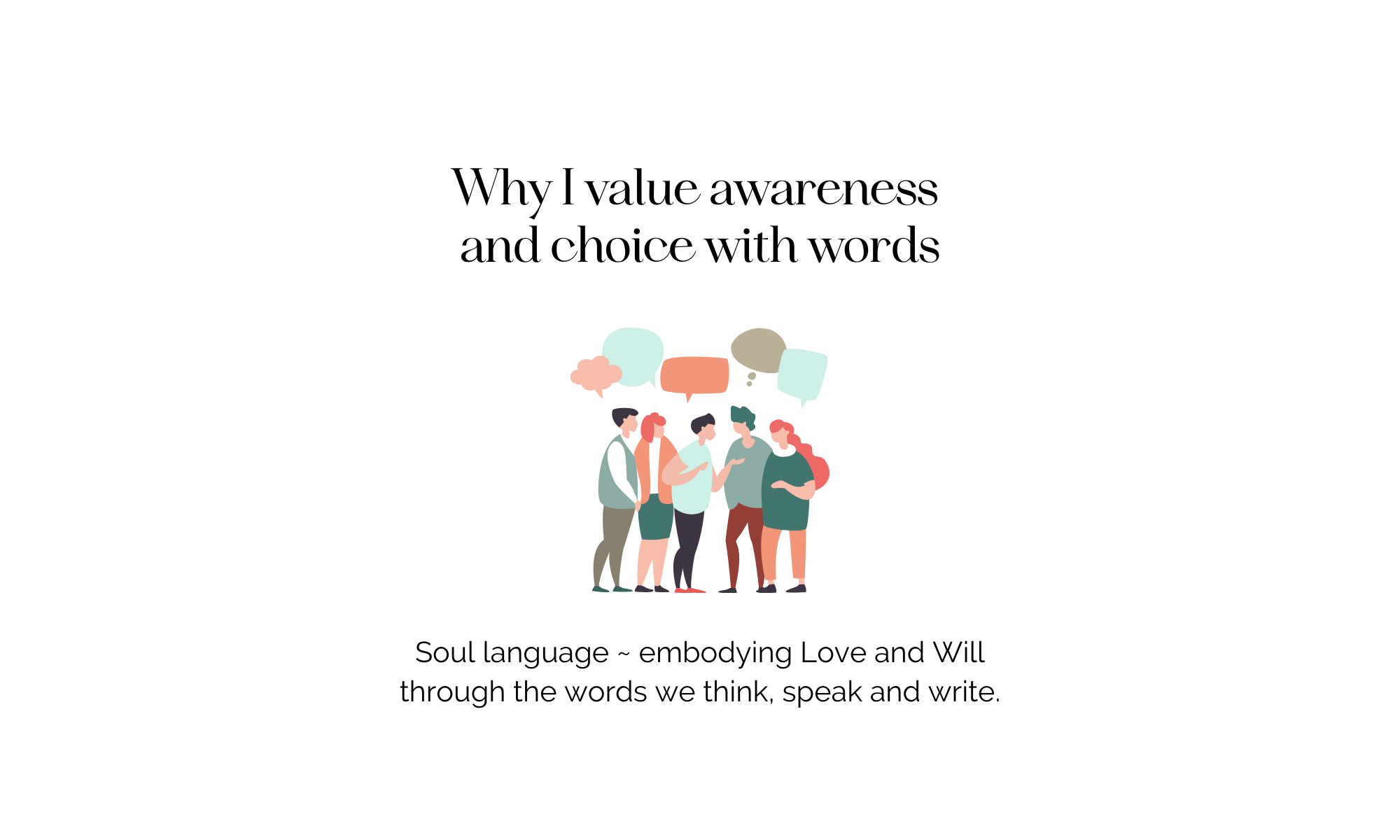You might have noticed how much I choose to think, write and speak particular words and not others!
In this post, I’m going to share why I do this, and why this compassionate awareness and choice with words is a part of The Marion Method.
Words have a powerful effect on our consciousness.
Words are a way that cultural conditioning is passed down.
Words are a way we can identify with lovingness and willingness, with deep and compassionate self-connection and intrinsic power. We can feel more or less loving and more or less powerful, depending on the words we choose.
Words are a way that we can release ourselves from cultural conditioning, since one key way that conditioning is passed down through language.
WORDS AND WILL AND INTRINSIC POWER
Words have been used to exert power-over others in ways that are internalised and we then use to exert power over ourselves.
The phrases; “you should” / “you have have to” / “you’re allowed” and “you can’t” and many more words and phrases are powerful ways of using power-over others.
They are such powerful spells that we internalise that and use power-over ourselves in the form of “I should” / “I have to” / I”m allowed” / “I can’t. This is how these forms of Disconnected Domination Culture (DDC) cultural conditioning are passed down.
These words around will trick us into believing that we aren’t powerful.
But because we ARE intrinsically powerful and because our true nature IS Love and Will, we can release ourselves from these spells and increasingly free ourselves from DDC conditioning.
WORDS AND LOVE AND INTRINSIC WHOLENESS
Words have also been used to shame others, again in ways that are internalised, so that we continue to shame ourselves.
The words and phrases, “good” and “bad” and “naughty” and “misbehaviour” and “you should be ashamed of yourself,” are all ways used to trick people into believe that there is something intrinsically “wrong” with them. And again, this cultural conditioning is easily passed down.
These words are spells which trick us into believing that we aren’t whole and complete and loved and loveable exactly as we are (even finding words to express this concept without DDC language can be tricky!)
Shame sticks are a powerful way to keep people buying into the DDC. The more we free ourselves from picking up shame sticks, the less we can be controlled.
We can wake up from the spells and gradually internalise a new, loving inner dialogue of deep self-compassion and compassion for others.
WORDS AND BODY AND MIND AND SOUL
Our use of words determines where we are speaking from.
When we say, “I feel frustrated,” we are inviting embodiment and connection with ourselves.
When we say, “You are annoying,” this thought disconnects us from ourselves and the other.
Do you feel the difference in where your consciousness is located in your body when you say:
“It’s astonishing,”
compared to when you say,
“I feel astonished”?
What about when you are asking someone about how they feel?
Do you notice a difference in how connected with yourself and the other you feel when you say,
“How does it feel?”
compared to
“How do you feel?”
How about,
“It feels…”
and
“I feel…”
Remember, this is not about ‘right’ or ‘wrong’, because that’s DDC thinking. This isn’t an invitation to say, “I’ve done something wrong,” because that’s DDC thinking.
This is an invitation to notice:
How we feel when we use different words;
Where we notice our consciousness is located in our bodies when we say something;
How connected with ourselves and others we feel;
How connected with our lovingness and willingness we feel;
How powerful we feel;
Our power to choose what words we think and speak and write.
WORDS AND IDENTITY
When we say, “I” we are talking from the place in us that we are identified with in that moment.
We can identify with our thoughts (even if we’re using the word “feel”) eg. “I feel disappointed with you,” is a thought.
Or we can identify with our embodied experience, and be centred in our Soul, our I, which is Love and Will, where we can be much more connected with our felt experience, our lovingness and our innate power.
As an example around will and power – you’ve probably heard me talk about the profound difference between saying,
“It’s not okay,”
which centres ourselves outside our bodies, and is a judgment,
and
“I’m not willing for,”
which centres ourselves profoundly in the centre of our consciousness and our body, in our willingness channel, which is where our life energy and Life’s energy flow, ie. our true power.
I invite you to play with words.
They are powerful spells of consciousness.
What words and phrases do you feel called to play with?
I invite you to share below.
Big love xoxo
I acknowledge all that I have learnt from Marshall Rosenberg and Nonviolent Communication about language over the past 20 years.
